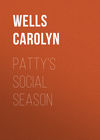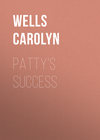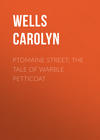Buch lesen: «The Emily Emmins Papers»
I
A Ticket to Europe
It has always seemed to me a pity that nearly all of the people one meets walking in New York are going somewhere. I mean they have some definite destination. Thus they lose the rare delight, that all too little known pleasure, of a desultory stroll through the city streets. For myself, I know of no greater joy than an aimless ramble along the crowded metropolitan thoroughfares. Nor does ramble imply, as some might mistakenly suppose, a slow, dawdling gait. Not at all; the atmosphere of the city itself inspires a brisk, steady jog-trot; but the impression of a ramble is inevitable if the jog-trot have no intended goal.
I am a country woman, – that is, I live in a suburban town; but it is quite near enough to the metropolis for us to consider ourselves near-New Yorkers. And Myrtlemead is a dear little worth-while place in its own way. We have a Current Culture Club and a Carnegie library and several of us have telephones. I am not a member of the Club, but that must not be considered as any disparagement of my culture – or, rather, of my capacity for assimilating culture (for the Club’s aim is the disbursement of that desirable commodity). On the contrary, I was among the first invited to belong to it.
“You must be a member, Miss Emmins,” said the vivacious young thing who called to lay the matter before me, “because you have so much temperament.”
This word was little used in Myrtlemead at this time (although, since, it has become as plenty as blackberries), and I simply said “What!” in amazement.
“Oh! yes, you have,” she twittered, “and you create an atmosphere. Don’t attempt to deny it, – you know you do create an atmosphere.” This was too much. I didn’t join the Club, although I occasionally look in on them at their cultured tea hour, which follows the more intellectual part of their programme. As they have delicious chicken-salad and hot rolls and coffee, I find their culture rather comforting than otherwise.
Living so near New York, I find it convenient to run into the city whenever I hear it calling.
In the spring its calls are especially urgent. I know popular sympathy leans toward springtime in the country, but for my part, as soon as March has blown itself away, and April comes whirling along the cleared path of the year, I hurry to keep my annual appointment to meet Spring in New York. The trees are budding in the parks, daffodils and tulips are blooming riotously on the street-corners, while hyacinths and lilacs blossom along the curb. A pearl-colored cloud is poised in that intense blue just above the Flatiron Building, and the pretty city girls smile as they prank along in their smart spring costumes behind their violet mows. The birds twitter with a sophisticated chirp, and the street-pianos respond with a brisk sharpness of tune and time. The very air is full of an urban ozone, that is quite different from the romantic lassitude of spring in the country.
Of course, all this is a matter of individual taste. I prefer walking in dainty boots, along a clean city pavement, while another equally sound mind might vote for common-sense shoes and a rough country road.
And so, as I, Emily Emmins, spinster, have the full courage of my own convictions, I found myself one crisp April morning walking happily along the lower portion of Broadway. Impulse urged me on toward the Battery, but, as often happens, my impulse was side-tracked. And all because of a woman’s smiling face. I was passing the offices of the various steamship companies, and I saw, coming down the steps of one of them, a young woman whose countenance was positively glorified with joy. I couldn’t resist a second glance at her, and I saw that both her hands were filled with circulars and booklets.
It required no clairvoyance to understand the situation; she had just bought her first ticket to Europe, and it was the glorious achievement of a lifelong desire. I knew, as well as if she had told me, how she had planned and economized for it, and probably studied all sorts of text-books that she might properly enjoy her trip, and make it an education as well as a pleasure. And as I looked at the gay-colored pamphlets she clutched, I was moved to go in and acquire a few for myself.
With Emily Emmins, to incline is to proceed; so I stepped blithely into the big light office and requested booklets. They were bestowed on me in large numbers, the affable clerk was most polite, and, – well, I’m sure I don’t know how it happened, but the first thing I knew I was paying a deposit on my return ticket to Liverpool.
I may as well confess, at the outset, that I am of a chameleonic nature. I not only take color from my surroundings, but reflect manners and customs as accurately and easily as a mirror. And so, in that great, business-like office, with its maps and charts and time-tables and steamer plans, the only possible thing to do seemed to be to buy my ticket, and I did so. But I freely admit it was entirely the influence of the ocean-going surroundings that made the deed seem to me a casual and natural one. No sooner had I regained the street, with its spring air and stone pavement, than I realized I had done something unusual and perhaps ill-advised. However, a chameleonic nature implies an ability to accept a situation, and after one jostled moment I walked uptown, planning as I went.
Two days later the postman brought me an unusually large budget of mail. The first letter I opened caused me some surprise, and a mild amusement. It began, quite cosily:
Miss Emily Emmins.
Dear Madam: Learning that you intend sailing from New York in the near future, I take the liberty of calling your attention to the Hotel Xantippe as a most desirable stopping place during your stay in this city.
The letter went on to detail the advantages and charms of the hotel, and gave a complete list of rates, which, for the comforts and luxuries promised, seemed reasonable indeed! But how in the world did the urbane proprietor of the Hotel Xantippe know that I contemplated a trip abroad? I hadn’t yet divulged my secret to my fellow-residents of Myrtlemead, and how an utter stranger could learn of it, was a puzzle to me. But the other letters were equally amazing. One from a dry-goods emporium besought me to inspect their wares before going abroad to buy. Another begged me to purchase their shoes, and gave fearful warnings of the shortcomings of English footgear. Another, and perhaps the most flattering, requested the honor of taking my photograph before I sailed. But one and all seemed not only cognizant of my recently formed plans, but entirely approved of them, and earnestly desired to assist me in carrying them out.
With my willingness to accept a situation, I at once assumed that somehow the news of my intended departure had crept into one or other of the New York daily papers. I couldn’t understand why this should be, but surely the only possible explanation was my own prominence in the public eye. This, I placidly admitted to myself, was surprising, but gratifying. To be sure, I had written a few nondescript verses, and an occasional paper on some foolish thing as a fine art, but I had not reached the point where my name was mentioned among “What Our Authors are Saying and Doing.”
However – alas for my vainglory! – a neighbor soon explained to me, that all up-to-date business firms procure lists of those who have bought steamship tickets, and send circular letters to each address. This was indeed a blow to my vanity, but so interesting were the letters which continued to pour in that I cared little for the reason of their sending. They pleased me mightily, because of their patronizing attitude, treating me as if I were either Josiah Allen’s wife or a Choctaw Indian. Invariably they assumed I had never been in the metropolis before, and would prove exceeding ignorant of its ways. Nor were they entirely mistaken.
One elaborate circular set forth the wonders of the city as viewed from the “Seeing [or Touring] New York Motor-Coach.” Now I had passed these great arks hundreds of times, but it had never occurred to me to enter one. And yet, so great is my susceptibility to suggestion, that I determined to take the trip before leaving my native land.
Another letter left me hesitating as to whether my proposed journey was advisable after all. This letter was from the Elsinore Travel Bureau, and explained how, by the purchase of a new-fangled stereoscope and innumerable sets of “views,” one could get far more satisfaction out of a European trip by staying at home than by going abroad. “So real are the scenes,” the circular assured me, “that one involuntarily stretches out a hand to grasp what isn’t there.” Surely, realism need go no farther than that; yet some over-exacting people might demand that the grasped-for thing should be there.
At least, that’s the way I felt about it; and besides, now that all Myrtlemead was stirred up over my going to Europe, I couldn’t decently abandon my project. That’s one of the delightful annoyances of life in a country village. Everybody belongs to everybody else, and your neighbors have a perfect right to be as interferingly helpful as they choose. My house was besieged by what I came to call the noble army of starters, for the kind-hearted ones brought me every imaginable help or hindrance to an ocean voyage.
I had already bought myself a steamer rug, whose soft bright colors and silky texture delighted my soul; but none the less were steamer rugs brought me by dozens, as intended loans. It was with a slight air of resentment that my would-be benefactors received my humble apology for possessing a rug of my own, and walked away with their plaids in their arms and their heads in the air. Then came one who earnestly advised me not to take my lovely, silky rug, as it was sure to be ruined on the steamer, and after that to be devoured by moths during its summer in a steamer trunk. The best plan, she informed me, was to hire a rug from the steamship company, as I would hire my deck-chair, and leave my own rug at home, to be used as a couch robe. Being amiable by nature I agreed to this plan. Next came a neighbor who, having heard that I had concluded to hire a rug on the steamer, asked to borrow mine to take with her on a lake trip. Of course I lent it to her, but a few weeks later, when I tried to cuddle into one of the small harsh rugs that the steamship company provides, I almost regretted my amiability.
Then came friends with cushions – large, small, and double-jointed. Also, they brought air-pillows, and water-pillows, and patent contrivances for comfort, that were numerous and bulky, and adequately expressed their donors’ kind interest in my well-being at sea. Also came many sure and absolute remedies for sea-sickness, or preventives thereof. Had I taken them all with me, and had they made good their promise, not one of the cabin passengers, or the steerage, need have been ill for a moment. Interspersed among the more material gifts was much and various advice.
This was easily remembered, for taken as a whole it included every possible way of doing anything. Said one: “Pack your trunks very tightly, for clothing carries much better that way.” Said another: “Pack your trunks very loosely; for then you will have room to bring home many purchases and yet declare at customs only the same number of trunks as you took with you from America.” Said a third: “Let me help you pack, for if a trunk is crammed too tightly or filled too loosely, it makes all sorts of trouble.”
But, being amiable, I smiled pleasantly on all, agreed with each adviser, and held my peace. For, to me, preliminaries mattered little, and I knew that as soon as I was fairly at sea, or at least beyond the three-mile limit, I could make my own plans, and carry them out without let or hindrance.
My itinerary was, of course, arranged and rearranged for me, but usually the would-be arbiters of my destinations fell into such hot discussions among themselves that they quite forgot I was going away at all. But it mattered little to me whether they advised the Riviera by way of the North Cape, or the Italian lakes after the Cathedral tour; for my entire summer was irrevocably planned in my own mind. No “touristing” for me. No darting through Europe with a shirtwaist in a “suit” case, and a Baedeker in my other hand.
No, my “tour of extended foreign travel,” as our local newspaper persisted in calling it, was, on my part, an immutable resolve to go by the most direct route to London and remain there until the date of my return ticket to New York. This plan, being simple in the main, left me leisure to listen to my friends’ advices and recommendations. But, though I listened politely, I really paid little heed, and at last I sailed away with the advice, in a confused medley drifting out of my memory.
The only points that seemed to be impressed on my mind were that, in London parlance, “Thank you” invariably means either “Yes” or “No” (nobody seemed quite sure which), and that in England one must always call a telephone a lift.
II
Crossing the Atlantic
The most remarkable effect of a sea-trip is, to my mind, its wonderful influence for amiability. I hadn’t passed Sandy Hook before I felt an affable suavity settling down upon me like a February fog. I am at all times of a contented and peaceful nature, but this lethargic urbanity was a new sensation, and, as I opined it was but the beginning of a series of new sensations, I gave myself up to it with a satisfied feeling that my trip had really begun.
And yet I was haunted by a vague uneasiness that it hadn’t begun right. I had planned to be most methodical on this voyage. I had resolved that when I came aboard I would go first to my stateroom and unpack my steamer trunk, arrange my belongings neatly in their proper portholes and bunkers, find my reserved deck-chair, and attach to it my carefully tagged rug and pillow. Then I meant to take off and pack away my pretty travelling costume, and array myself in my “steamer clothes,” these having been selected with much care and thought in accordance with numerous and conflicting advices.
Whereas, instead of all this, I had hurriedly looked into my stateroom, and only noted that it was a tiny white box, piled high with luggage, part of which I recognized as my own, and the rest I assumed belonged to my as yet unknown room-mate. Then I had drifted out on deck, dropped into some chair, I know not whose; and, still in my trig tailor-made costume and feathered hat, I watched the coast line fade away and leave the sea and sky alone together.
Suddenly it occurred to me that I was receiving “first impressions.” How I hated the term! Every one I knew, who had ever crossed the ocean before I did, had said to me, “And you’ve never been over before? Oh, how I envy you your first impressions!”
As I realized that about seventy-nine people were even then consumed with a burning envy of these first impressions of mine, I somehow felt it incumbent upon me to justify their attitude by achieving the most intensely enviable impressions extant.
And yet, so prosaic are my mental processes, or else so contrary-minded is my subconscious self, that the impression that obtruded itself to the exclusion of all others was the somewhat obvious one that the sea air would soon spoil my feathers. While making up my mind to go at once to my stateroom and save my lovely plumes from their impending fate, I fell to wondering what my room-mate would be like. I knew nothing of her save that her name was Jane Sterling. This, though, was surely an indication of her personality, for notwithstanding the usual inappropriateness of cognomens, any one named Jane Sterling could not be otherwise than well born, well bred, and companionable, though a bit elderly.
I seemed to see Jane Sterling with a gaunt face, hooked nose, and grizzled hair, though I admitted to myself that she might be a fragile, porcelain-like little old maid.
This conflict of possibilities impelled me to go to my stateroom and make Jane Sterling’s acquaintance, and, incidentally, put away my best hat.
So I started, and on my way received another of my “first impressions.”
This was a remarkable feeling of at-homeness on the steamer. I had never been on an ocean liner before, yet I felt as though I had lived on one for years. The balancing of myself on the swaying stairs seemed to come naturally to me, and I felt that I should have missed the peculiar atmosphere of the dining-saloon had it not assailed my senses.
As I entered Stateroom D, I found Jane Sterling already there. But as the physical reality was so different from the lady of my imagination, I sat down on the edge of my white-spread berth and stared at her.
Sitting on the edge of the opposite berth, and staring back at me, was a small child with big eyes. She wore a stiff little frock of white piqué, and her brown hair was “bobbed” and tied up with an enormous white bow. Her brown eyes had a solemn gaze, and her little hands were clasped in her lap.
It was quite needless to ask her name, for Jane Sterling was plainly and unmistakably written all over her, and I marvelled that the name hadn’t told me at once what she looked like.
“How old are you, Jane?” I asked.
“Seven,” she replied, with a little sigh, as of the weight of years.
Her voice satisfied me. She was one of those unusual children, whom some speak of as “queer,” and others call “old-fashioned.”
But they are neither. They are distinctly a modern variety, and their unusualness lies in the fact that they have a sense of humor.
“And is this your first trip abroad?” I went on.
“No, my seventh,” said Jane, with a delicious little matter-of-fact air.
“Indeed! Well, this is the first time I have crossed, so I trust you will take pity on my ignorance, and instruct me as to what I should do.”
I said this with an intent to be sociable, and make, the child feel at ease, but no such effort was necessary.
“There is nothing to do diffelunt,” she said, with a bewitching smile. “You just do what you would in your own house.”
It was the first really good advice I had had concerning my steamer manners, and I put it away among my other first impressions for future use.
Then Jane’s mother appeared, and I learned that she occupied the next stateroom, and that she hoped Jane would not annoy me, and that she was glad I liked children, and that she had three, and that they crossed every year, and that if I wanted anything at all I was to ask her for it. Then she put a few polite questions to me, and duly envied me my first impressions, and returned to her other babies.
Jane proved a most delightful roommate, and, as she was never intrusive or troublesome, I felt that I had drawn a prize in the ship’s lottery.
The morning of the second day I rose with a determination to get to work. I had no intention of dawdling, and, moreover, I had much to do. In the first place, I wanted to get settled in my deck-chair, in that regulation bent-mummy position so often pictured in summer novels, and study my fellow-passengers. I had been told that nothing was so much fun as to study people on deck. Then I had many letters to write and many books to read. I wanted to learn how to compute the ship’s log, and how to talk casually of “knots.” After all these had been accomplished, I intended to plan out my itinerary for the summer. This I wanted to do after I was out of all danger of advice from friends at home and before I made the acquaintance of any one on board who might attempt to advise me.
So determined was I to plan my own trip that I would have been glad to get out on a desert island and wait there for the next steamer, rather than have any assistance in the matter of laying out my route.
Immediately after breakfast, therefore, arrayed in correct steamer costume, and carrying rug, pillow, paper-covered novel, veil, fur boa, and two magazines, I went to my deck-chair and prepared to camp out for the morning. As the deck steward was not about, I tried to arrange my much desired mummy effect myself. Technique seemed lacking in my efforts, and, slightly embarrassed at my inability to manage the refractory rug, I looked up to see Jane watching me.
“You mustn’t put the rug over you,” she explained, in her kind little way. “You must put yourself over the rug.”
At her advice I got out of the chair, and she spread the rug smoothly in it.
“Sit down,” she said, briefly, and I obeyed.
Cleverly, then, she flung up the sides and tucked in the corners, until the rug swathed me in true seventeenth-trip fashion. Jane proceeded to arrange my pillow and the other odds and ends of comfort. She disapproved, however, of my reading-matter.
“Magazines won’t stay open,” she observed, “and paper books won’t, eever.”
Jane’s few mispronunciations were among her chiefest charms.
“But it won’t matter,” she added cheerfully. “You won’t read, anyhow.”
This reminded me that I had no intention of reading, being there for the purpose of studying my fellow-passengers.
I was still obsessed by that strange sensation of inanition.
Although beatifically serene and abnormally good-natured, I felt an utter aversion to exertion of any kind, mental, moral, or physical. Even the thought of studying my fellow-travellers seemed a task too arduous to contemplate.
And so I sat there all the morning and not a fellow-traveller was studied.
“This won’t do,” I said to myself, severely, after luncheon. “Here you are, not a hint of sea-sickness, the day is perfect, you know how to adjust your rug, and all conditions are favorable. You must study your fellow-travellers.”
But the afternoon showed little improvement on the morning. As a result of desperate effort, I scrutinized one lady and decided to call her the Lady with the Green Bag.
It wasn’t a very clever characterization, but it was, at least, founded on fact.
Another I conscientiously contemplated, and finally dubbed her the Lady Who Isn’t an Actress. This was rather a negative description, but I based it on the neatness of her vanity-bag and the carelessness of her belt, and I am sure it was true.
The Clucking Mother was easily recognized, and a pink-cheeked and white-handed young man, who attempted to talk to me, I snubbed, and then to myself I designated him as Simple Simon.
I wasn’t really rude to him, and I fully intended to make acquaintances among the passengers later on; but I am methodical, and after I had all my other tasks attended to, I hoped to have two or three days left for social intercourse.
But after a time the chair next mine was left vacant, and then a laughing young girl seated herself in it.
Apparently it didn’t belong to her, and she sat down there with the express purpose of talking to me. My arduous study of my fellow-travellers had somewhat wearied me, and her sudden and uninvited appearance disturbed that serene calm which I had supposed unassailable, and so I angrily characterized her in my mind as a Bold-Faced Jig.
This name was so apt that it really pleased me, and I involuntarily smiled in appreciation of my appreciation of her.
So sympathetic was she (as I afterward discovered) that she smiled too, and then I couldn’t, in common decency, be rude to her. She chatted away, and before I knew it I was charmed with her. I didn’t change the name I had mentally bestowed on her, but, instead, I told her of it, and it delighted her beyond measure. I told her, too, how I intended to devote the next two days to planning my summer trip, then a day for writing letters, and after that I hoped to play bridge, or otherwise hobnob socially with certain people whom I had mentally selected for that purpose.
The Bold-Faced Jig laughed heartily at this.
“Haven’t you any idea where you’re going to travel?” she asked.
“Not the slightest.”
“Well, let me advise you – ”
“Oh, please don’t!” I cried. “I left my planning until now in order to get away from all advisers. I must decide for myself. I know just what I want, and I can’t bear to be interfered with.”
The B. – F. J. looked amazed at first, and then she laughed.
“All right,” she said. “Now listen, Miss Emmins. I think you’re delightful, and I’m going to help you all I can by not advising you. But if you’ve not finished your itinerary plans in two days, mayn’t I tell you then what I was going to advise?”
“Yes,” I said, with dignity and decision, “if you will keep away from me for two days, and do all you can to keep others away.”
She promised, and it was more of a task than it might seem, for as I sat in my deck-chair, or, oftener, at a table in the library, surrounded by Baedekers, time-tables, maps, guide-books, and Hare’s Walks in London, many of the socially inclined or curious-minded paused to make a tentative remark. My replies were so coolly polite that they rarely ventured on a second observation, but I soon discovered that my laughing friend had told her comrades what I was doing, and they awaited the result.
It is strange what trivialities will interest the idle minds of those who dawdle about in the library of an ocean steamer.
Jane would occasionally come and stand by me, saying wisely, “Are you still making your itinnery?”
When I said yes, she sighed and smiled and ran away, being desirous not to bother.
The first morning I engaged in this work, I read interestedly of picture-galleries and architectural specialties. That afternoon my interest waned, and I studied time-tables and statistical information. The next morning I grew sick of the whole performance and, bundling the books and maps away, I went out to my deck-chair, and idled away the hours in waking dreams that never were on sea or land.
That afternoon the Bold-Faced Jig approached me.
“It’s all over,” I said. “I’ve capitulated. I make no plans while I’m on this blessed ocean. It’s wicked to do anything at all but to do nothing.”
“And don’t you want my advice?” she asked, laughing still.
“I don’t care,” I answered. “You can voice your advice if you choose. I sha’n’t listen to it, much less follow it.”
Her girlish laughter rang out again. “That was my advice,” she said. “I was going to tell you not to plan any trip while you are at sea. Just enjoy the days as they come and go; don’t count them; don’t do anything at all but just be.
“I’m not through yet,” she went on. “Don’t write any letters or read any books. Don’t study human nature, and of all things don’t voluntarily make acquaintances. If they happen along, as I did, chat a bit if you choose, and when they pass on, forget them.”
And so I took advice after all. I made no plans, I made no abstruse diagnoses of human character, I made no acquaintances save such as casually happened of themselves. And the days passed in a sort of rose-colored haze, as indefinite as a foggy sunrise, and as satisfying as a painted nocturne of Whistler’s. And so, my first impressions of my first ocean crossing are indeed enviable.




















